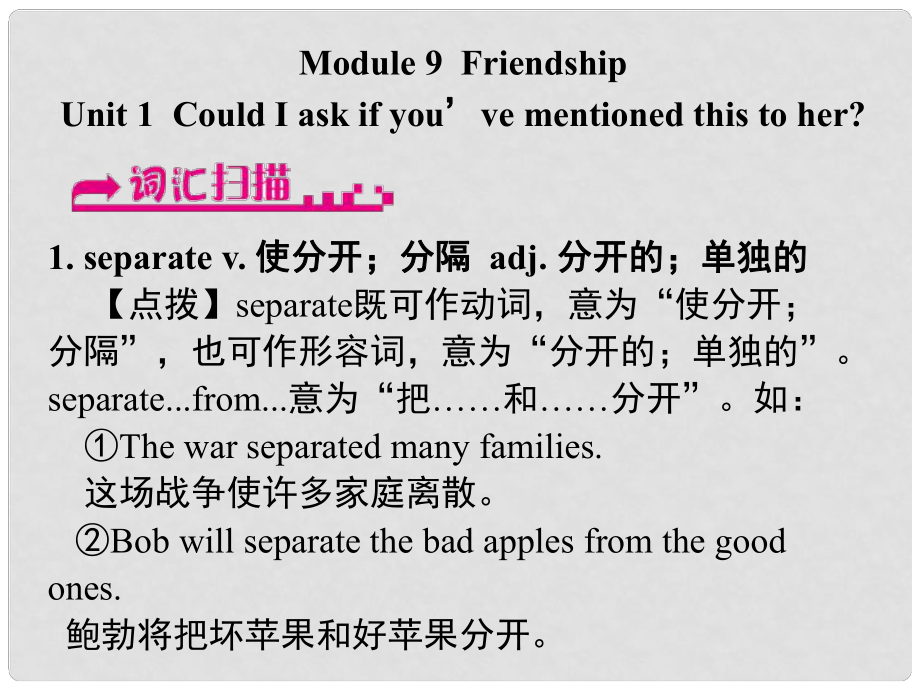《浙江省嘉興市秀洲區(qū)八年級(jí)英語下冊(cè) Module 9 Friendship Unit 1 Could I ask if you’ve mentioned this to her課件 (新版)外研版》由會(huì)員分享�����,可在線閱讀,更多相關(guān)《浙江省嘉興市秀洲區(qū)八年級(jí)英語下冊(cè) Module 9 Friendship Unit 1 Could I ask if you’ve mentioned this to her課件 (新版)外研版(15頁珍藏版)》請(qǐng)?jiān)谘b配圖網(wǎng)上搜索�����。
1�����、Module 9 FriendshipUnit 1 Could I ask if youve mentioned this to her?1. separate v. 使分開�;分隔使分開;分隔 adj. 分開的�����;單獨(dú)的分開的�����;單獨(dú)的 【點(diǎn)撥】separate既可作動(dòng)詞�����,意為“使分開�;分隔”,也可作形容詞�����,意為“分開的�;單獨(dú)的”。separate.from.意為“把和分開”�����。如: The war separated many families. 這場戰(zhàn)爭使許多家庭離散���。 Bob will separate the bad apples from the good ones. 鮑勃將把壞蘋果和好蘋
2����、果分開�����。 2. explain v. 解釋��;說明解釋�����;說明 【點(diǎn)撥】explain作動(dòng)詞,意為“解釋�����;說明”����,后可接名詞性從句或“特殊疑問詞+動(dòng)詞不定式”結(jié)構(gòu)作賓語。如: Can you explain this question to me? 你能給我解釋這個(gè)問題嗎�? Nick explained why he was late for school. 尼克解釋了他上學(xué)遲到的原因。 【注意】explain不能帶雙賓語��,即不能說exp-lain sb. sth.�。 3. mention v. 提及;談到提及�����;談到 【點(diǎn)撥】(1)mention作動(dòng)詞���,意為“提及���;談到”。mention sth.
3���、/sb. to sb.意為“向某人提及某事/某人”��。如: Nobody mentioned anything to me about it 沒人跟我提及這件事�。 【延伸】Dont mention it.常用于日?��?谡Z中�����,用作回復(fù)他人道謝時(shí)的答語����,意為“不客氣”�����。如: Thanks for all your help 多謝你幫忙��。 Dont mention it 不客氣���。(2)mention還可以作名詞�,意為“提及�;說起”����。 4. treat v. 對(duì)待�;看待對(duì)待;看待 【點(diǎn)撥】treat作動(dòng)詞����,意為“對(duì)待;看待”�����。treat.like/as.意為“把當(dāng)作看待”��。如: Dont treat me
4��、 as a child 不要把我看作孩子�����。 5. herself pron. 她自己她自己 【點(diǎn)撥】herself是she的反身代詞����,反身代詞用于指動(dòng)作返回到執(zhí)行者本身或用來加強(qiáng)語氣。反身代詞還包括:myself(我自己), yourself(你自己), himself(他自己), itself(它自己), ourselves(我們自己), yourselves(你們自己), themselves(他們/她們/它們自己)。如: She teaches herself English. 她自學(xué)英語�。 You should do it by yourself. 你應(yīng)該親自去做。 6. introd
5����、uce v. 介紹�����;引見介紹�;引見 【點(diǎn)撥】(1)introduce作動(dòng)詞,意為“介紹����;引見”。introduce.to.意為“把介紹給”�����。如: Let me introduce Mr Green to you. 讓我向您介紹格林先生����。(2)introduce oneself 意為“自我介紹”。如: May I introduce myself? My name is Jim Green. 我能自我介紹一下嗎����?我叫吉姆格林����。 7. encourage v. 鼓勵(lì)�;激勵(lì)鼓勵(lì);激勵(lì) 【點(diǎn)撥】(1)encourage作動(dòng)詞�����,意為“鼓勵(lì)����;激勵(lì)”。encourage sb. to do sth.意為“鼓
6��、勵(lì)某人做某事”����。如: My parents often encourage me to study hard. 我的父母經(jīng)常鼓勵(lì)我努力學(xué)習(xí)。(2)encourage sb. in sth.意為“在某方面鼓勵(lì)某人”�����。如: My parents encourage me in my study. 我父母對(duì)我的學(xué)習(xí)給予了鼓勵(lì)�。 1. Is that Mrs King? 您是金太太嗎����?您是金太太嗎��? 【點(diǎn)撥】Is that.?是打電話時(shí)詢問對(duì)方身份的常用語�,表示“你是嗎”,還可以說“Is that.speaking?”�。在打電話時(shí),常用this指代“我”�����,that指代“你”�����。如: Whos that
7����、speaking? 你是誰����? This is Tom speaking. 我是湯姆。 【延伸】常用的“打電話”交際用語: (1)想與某人通話時(shí)一般用: Could/Can/May I speak to., please? 請(qǐng)問我可以和通話嗎����?請(qǐng)找接電話好嗎�����?(2)其答語常用: Certainly./Sure./Of course. 當(dāng)然可以�。 Hold on, please./Hold for a moment, please./Wait a minute, please 請(qǐng)先別掛斷電話����。/請(qǐng)稍等。 Im afraid he/she isnt here now. 恐怕他她這會(huì)兒不在��。 2. M
8���、aybe she doesnt feel very sure of herself in her new school. 也許是她在新校園里對(duì)自己不太自信�����。也許是她在新校園里對(duì)自己不太自信����。 【點(diǎn)撥】feel/be sure of oneself意為“自信����;有信心”����。如: Hes not so sure of himself these days. 他近來對(duì)自己不太自信����。 3. Im sure she regrets hurting you. 我敢肯定她后悔傷害了你。我敢肯定她后悔傷害了你�����。 【點(diǎn)撥】regret doing sth.意為“對(duì)做過的事情感到后悔”���;而regret to do s
9、th.意為“對(duì)要做的事情感到遺憾”��。如: I regretted spending so much money buy-ing such a computer. 我后悔花這么多錢買了這么一臺(tái)電腦��。 I regret to tell you that your team didnt win the match. 我遺憾地告訴你你們的隊(duì)沒有贏得比賽��。 4. So be patient with her and explain to her that she can make friends with your other friends too. 所以對(duì)她要有耐心����,向她解釋她也能與你的其他朋所以對(duì)
10、她要有耐心�����,向她解釋她也能與你的其他朋友交朋友。友交朋友�����。 【點(diǎn)撥】(1)be patient with意為“對(duì)有耐心”�。如: She is very patient with young children. 她對(duì)幼兒很有耐心。 另外����,還有固定搭配:be patient to do sth.,意為“有耐心做某事”���。如: 另外�����,還有固定搭配:be patient to do sth.�����,意為“有耐心做某事”��。如: Our teacher is very patient with us She is always patient to do everything for us 我們老師對(duì)我們很有耐心�,她總是很耐心地為我們做一切。 【延伸】patience為名詞�����,意為“耐心”���;patient也可作名詞�,意為“病人”��;impatient為形容詞��,意為“不耐煩的”��。如: My father had great patience with me when I was a patient. 爸爸在我生病的日子里對(duì)我很有耐心����。(2)make friends with sb.意為“與某人交朋友”���。如: Im glad to make friends with you. 很高興能和你交朋友����。
 浙江省嘉興市秀洲區(qū)八年級(jí)英語下冊(cè) Module 9 Friendship Unit 1 Could I ask if you’ve mentioned this to her課件 (新版)外研版
浙江省嘉興市秀洲區(qū)八年級(jí)英語下冊(cè) Module 9 Friendship Unit 1 Could I ask if you’ve mentioned this to her課件 (新版)外研版

